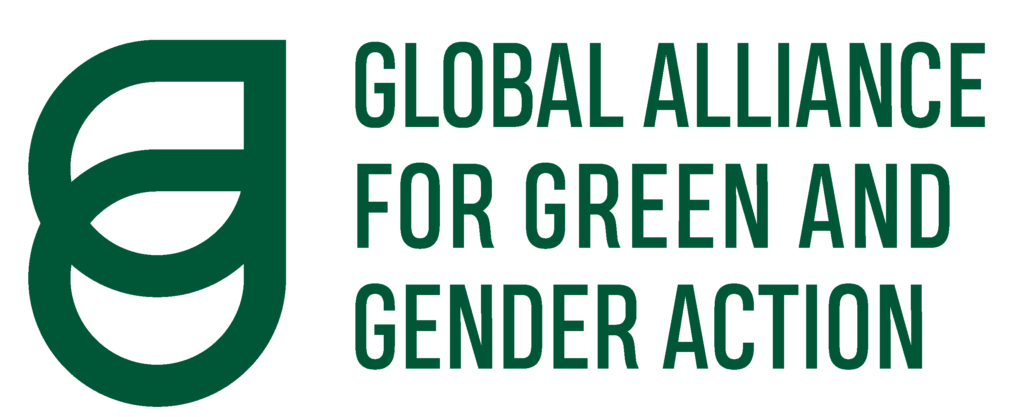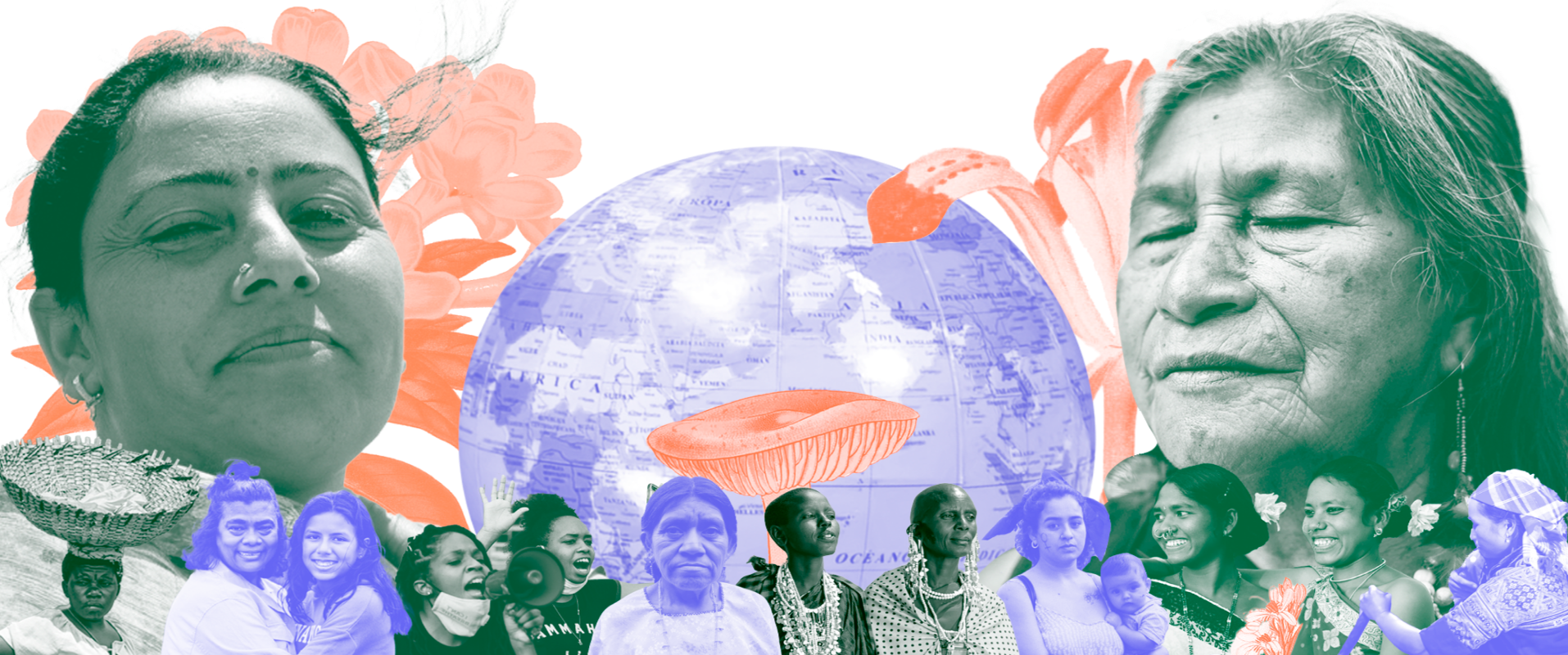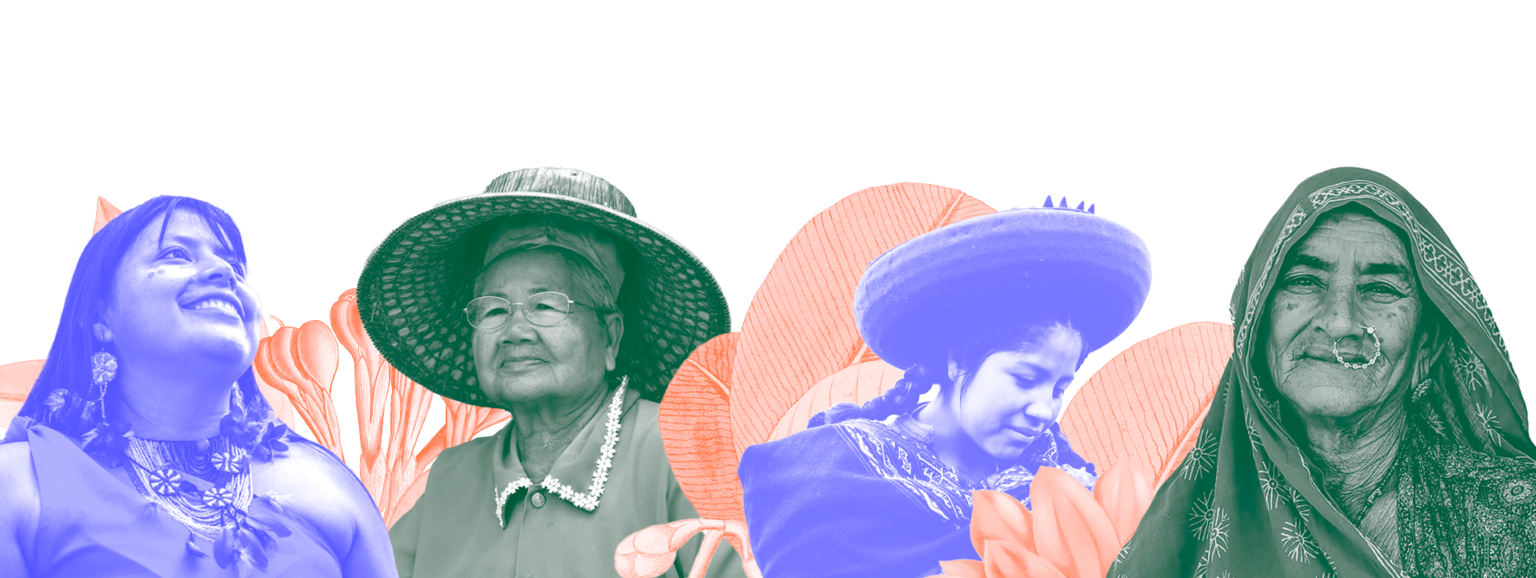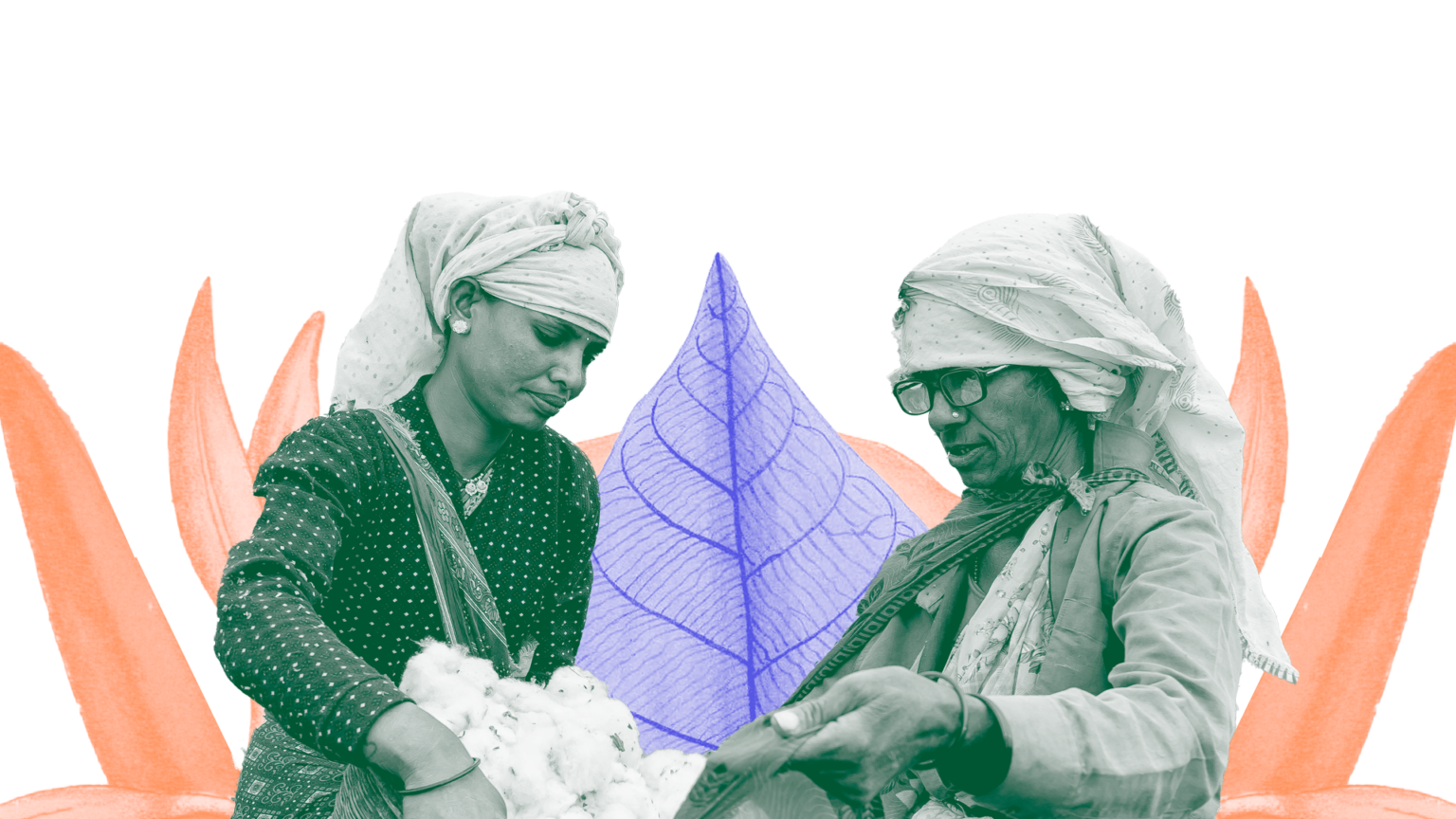


CLIMATE & GENDER
JUSTICE SUMMIT
DAR ES SALAAM, TANZANIA
SEPTEMBER 27 TO 29, 2024

Background & Context
In 2013, Prospera INWF and Global Greengrants Fund (GGF) began an alliance to bring together environmental and women’s funds, and climate justice and women’s rights activists together. The purpose was to share strategies across movements and build lasting relationships. After a year of preparation, in 2014, we jointly hosted a Summit on Women and Climate in Bali. This gathering resulted in important trends in our field: it was critical to consolidate the Global Alliance for Green and Gender Action (GAGGA); the joint research GGF and Prospera completed in 2018 on funding at the nexus of women’s environmental action (Our Voices, Our Environment); and numerous media stories, case studies, and general awareness raising of the links between gender and environmental justice. The New York Times published two articles about the summit, and funding on this intersection was beginning.

THE OPPORTUNITY
Given the decade anniversary of the Bali summit this year, and coinciding with Prospera’s Biennial, GGF, Prospera, and GAGGA produced an analysis of funding trends and data going to the intersection of gender and environment. The results clearly indicate that very limited funding goes to this work (50M out of 4.1B) and that most grants are being made by public funds (including Prospera and GGF members). Thus, much more attention needs to be paid to the political relevance and urgency of the issue, as well as to devoting greater financial, human, and political resources towards gender and environmental justice. This summit will build more traction, generate political will, build conceptual clarity among participants, and harness common objectives and strategies towards collective action.

WHO WE ARE

It is one of the leading grassroots environmental justice grant makers in the world, with a grant making network of 27 advisory boards comprising over 230 activists supporting grassroots-led efforts to protect the planet and the rights of people

It is a global political network of 48 bold, intersectional, diverse, and autonomous women’s and feminist funds that nurture transformation by resourcing, supporting, and accompanying movements led by women, girls, trans, intersex, and non-binary people, and collectives primarily in the Global South and East.

The Global Alliance for Green and Gender Action is a diverse network of women’s funds, environmental justice funds, non-governmental organizations (NGOs), and women-led community-based organizations (CBOs) that join forces to secure women’s rights to water, food security, and to a clean, healthy, and safe environment by rallying the collective power of gender, climate and environmental justice movements around the world.

Who will we bring together
Summit Objectives
To align on a collective narrative for climate and gender justice from the perspective of the Global South.
To develop a communique that advances gender and climate justice action in the current context.
To agree on ways to take the communique forward and use it as an organizing and advocacy tool for the years to come.
To share with funders a landscape on what, whom, where, and how to resource climate and gender justice.
General methodology
This Summit has been designed as a working meeting. We will have a few plenaries but most of the time participants will be breaking out into five concurrent “Thematic Working Groups” developed based on participant’s feedback through the survey and interviews. Each Thematic Working Group will have a facilitator, notetaker, and Co-Chairs. Throughout the Summit, the facilitators will work to weave the work of all five Themes to support the objective of creating a collective communique that can then be taken forward by participants in different ways.

Themes Working Groups

Defense of the commons (land, forests, oceans, and other water bodies)
‘The commons’ refers to territories that are accessible to everyone, and that are conserved and managed collectively for use by present and future generations, including land, forests, oceans, and other bodies of water. These resources are facing growing threats of encroachment and extinction due to destructive capitalist activities including privatization, extraction, land grabs, pollution, and deforestation, among others. The burden of defending the commons disproportionately falls on women and marginalized groups, including Indigenous communities, who are also the most impacted by their destruction in both their paid and unpaid work.
Questions:
- What needs to be done at local through global levels to prevent continuing destruction of the commons, and therefore alleviate the burden falling on women to protect them?
- What needs to be done to transform global economic systems to improve women’s livelihoods?
- What are the main challenges in resourcing transformative work defending the commons?
Food sovereignty and transformation of rural economies in the South
Historically, food has played a dual role: on the one hand it is a fundamental necessity of human life, and on the other it is a potential catalyst for economic transformation. Production of food for sale has played a key role in livelihoods and the development of economies for thousands of years. Smallholder farmers today manage 60% of global food production and 80% of total arable land, yet they are some of the poorest people on the planet. Through trade rules and agreements, constructed around the World Trade Organization (WTO), multinational corporations have monopolized trade in food and undercut smallholder farmers. Through these same tools, the policy space and domestic revenue of states across the South has been gutted and smallholder farmers and fisherfolk have largely been left to fend for themselves. This has had devastating effects in terms of widespread poverty and food insecurity, as well as climate change: the multinational corporations who reap outsized profits from trade in food have been able to perpetrate land grabs in rural areas that are in desperate need of economic stimulus. Rural economies need to transform to solve the dual problems of food insecurity and widespread poverty, along with some of the highest rates of gender inequality globally.
Questions:
- What needs to be done to transform the global food system and empower smallholder farmers and fisherfolk?
- How can food system transformation reduce unequal burdens of care work on rural women?
- What areas of work around the rural economy need to be resourced?

Energy transition, critical minerals, and economic transformation in the Global South
The prioritization of profit over nature has not only created the climate crisis, but also attempted to transform it from an existential threat into an economic opportunity, causing global economic inequality to filter into climate ‘false solutions.’ This push for a ‘just transition’ through renewable energy and ‘critical minerals’ has created a new frontier for multinational corporations and other powerful private interests. Countries of the South, particularly in Africa and Latin America, are the source of vast critical mineral deposits and fossil fuels- crucial both for enabling renewable energy transitions as well as financing economic development in the South. These sources of wealth are mainly controlled and extracted from by Northern-based multinational corporations, with no positive impact on domestic capabilities or needs. At the same time, if properly harnessed, financed, and regulated by active states, they can potentially contribute to equitably transformed, resilient economies and provide improved livelihood opportunities for the Global South.
Questions:
- How can the energy transition, including women’s access to energy, improve rural livelihoods?
- Can critical minerals power sovereign development processes in the Global South?
- What is missing from work being done on critical minerals and the energy transition, and what are some strategies to get these areas funded?

Climate finance as a justice issue
As climate change rapidly worsens, bringing with it devastating social and environmental impacts which exacerbate gender inequality, the loss and damage as well as adaptation and mitigation needs of countries in the Global South is enormous. Estimates of the financial burden created by the climate emergency in the Global South show that needed spending far surpasses combined totals of official development assistance, concessional financing, and development aid, and is about equal to what is currently being spent on debt servicing. This injustice comes on top of starkly unequal responsibility for emissions, with advanced industrialized countries continuing with these patterns while withholding financial compensation for historical climate debt. It does not seem likely that the Loss and Damage Fund, while historic simply in its establishment, will be operationalized quickly enough to fulfill the promises hinged on it.
Questions:
- What are some strategies for non-debt-based climate finance?
- How can states in the Global South rely on their own resources to finance needed climate and social investments?
- How can we enhance and resource cross movement work across climate, gender, debt, and trade justice?

Caring and interdependence for climate frontline communities
Frontline communities, including Indigenous women and women’s rights, environmental, and human rights defenders, are confronting states, multinational corporations, and politicians in power to try and make a difference in the face of multiple and intersecting crises. They are bearing the burden of this work while being confronted with threats to their lives, work, and livelihoods within shrinking or closing civic space. To sustain their continuing fights, themselves, their communities, and the lands, oceans, and territories where they live, these activists create webs of support, safety, and security. The physical and mental health toll that this work entails is enormous yet is often not taken seriously by those on the receiving end of this work or outside their communities, and especially not by funders. This invalidates the interdependence between peoples and ecosystems, and invisibilizes the emotional labor disproportionately provided by women. Care work is and always has been at the center of community-led resistance, which is more necessary than ever, but care work needs to be redistributed among families, the state, and the market.
Questions:
- How is care linked to ecological sustainability and alternatives to the current inequitable economic model?
- What are some strategies to get this labor funded and provisioned as a necessary part of continuing activism?
All themes will also take into account intersecting issues such as resource mobilization, resilience & adaptation, mitigation and disaster response, and economic justice.
Summit Agenda
*There will be a Welcome Dinner on September 26th at 7pm
DAY 1
September 27
September 27
6:30 – 8:30 | Breakfast |
8:30 – 9:45 | PLENARY (KIBO ROOM) Grounding Ourselves: In Conversation with Grace Scorey, Maimuna Kanyamala and Pontso Mafethe Bridging Contexts: Welcome & Overview, In conversation with Carla Lopez, Alexandra Garita, Laura Garcia and Terry Odenhal PLENARY (KIBO ROOM) Grounding Ourselves: In Conversation with Grace Scorey, Maimuna Kanyamala and Pontso Mafethe Bridging Contexts: Welcome & Overview, In conversation with Carla Lopez, Alexandra Garita, Laura Garcia and Terry Odenhal |
9:45 – 10:15 | Break |
10:15 – 13:30 | PLENARY (KIBO ROOM) Opening Panel Gender, Climate and Environmental Justice Movements: Perspectives from activists Asad Rehman, Noelene Nabulivou, Maria Matui Transition to BREAKOUT THEMES WORKING GROUPS
Connecting with each other, developing a collective understanding of each theme and where we locate ourselves in the same. |
13.30-15:00 | Lunch |
15:00 – 16:30 | Identifying gaps and key priority areas in each theme
BREAKOUT THEMES WORKING GROUPS
Closing (In breakout groups) |
16:00 – 16:30 | |
16:30 -17:00 | |
17:00 – 17:30 | Break |
17:30 – 18:00 | Free |
18:00 – 19:00 | Drafting Committee |
19:00- 20:30 | Dinner |
DAY 2
September 28
September 28
6:30 – 8:30 am | Breakfast |
8:30 – 11:00 am | PLENARY (KIBO ROOM)
Lightning Talk: Show me the money! Funding at the intersection of climate justice
Weaving Strategies with the Drafting Committee: Insights from Day 1 Learning as Regions: Articulating needs and possibilities for collaborations. (An opportunity to network)
|
11:00 – 11:30 | Break |
11:30 – 13:30 | BREAKOUT THEMES WORKING GROUPS
Identifying possible actions within each Theme. |
13.30-15:00 | Lunch |
15:00 – 16:00 | BREAKOUT THEMES WORKING GROUPS
Defense of the commons (Lake Victoria room) Food sovereignty (Kibo/Plenary room) Energy Transition (Lake Tanganyika room) Climate Financing (Zanzibar room) Caring and Interdependence (Kibo/Plenary room)
Continued- Articulating actions)
|
| |
16:00 -16:30 | Break |
16:30 – 18:00 | PLENARY (KIBO ROOM) Building political solidarity across the global south: In conversation with our Co-Chairs |
| |
18:00 – 19:00 | Drafting Committee |
19:00- 20:30 | Dinner |
DAY 3
September 29
September 29
6:30 – 8:30 am | Breakfast |
9:00 – 10:30 | PLENARY (KIBO ROOM) Gender, Climate, and Environmental Justice: Perspectives and Politics from the Global South (Astrid Puentes, Jayson Porter, Maureen Penjueli, Hilda Nakabuye) Building political solidarity across the Global South (continued) |
10:30 – 11:00 | Break |
11:00 – 13:30 | Building political solidarity across the Global South (continued)
|
13.30-15:00 | Lunch |
15:00 – 17:00 | Building political solidarity across the Global South (continued)
|
17:00 – 17:30 | Break |
17:30 -18:00 | Celebration! |
18:00 – 19:00 | Free |
19:00- 20:30 | Cocktail/Dinner Party |
Speakers per day
DAY 1
September 27
September 27
| 6:30 – 8:30 am | Grounding Ourselves: In conversations with Maimuna and Grace |
| Grace Scorey | Grace Scorey is a passionate advocate for women’s rights and empowerment, with a focus on pastoral communities and women around the world. Growing up in a polygamous family, she witnessed firsthand the marginalization and struggles faced by women in such environments. Determined to change the narrative and uplift women, she pursued a degree in Social Work and Administration, which laid the foundation for her career as a dedicated social worker. Her journey led her to become actively involved in the Pastoral Women Council (PWC) organization as a project coordinator, where she found a platform to amplify voices and address the needs of women in pastoral communities. Through her work, she aims to challenge societal norms and advocate for policies that promote gender equality, and access to education, healthcare, and economic opportunities for women. With her background and unwavering commitment, she embodies resilience and determination in her mission to create a more inclusive and equitable society for women. |
| Maimuna Kanyamala | Maimuna Kanyamala is a dedicated Tanzanian activist, entrepreneur, environmentalist, and feminist with over 30 years of experience advancing the rights of women, girls, children, and marginalized communities. As co-founder of Kivulini Women’s Rights Organization and founder of MikonoYetu, she has mobilized thousands to prevent gender-based violence and empowered women through economic initiatives that tackle climate change, particularly in rural areas. Recognized as a “Woman of Courage” by the U.S. Embassy in Tanzania, Maimuna has built global solidarity on issues such as gender-based violence, HIV/AIDS, and poverty. She also co-founded GreenMinds, a youth-led project promoting sustainable leadership, and currently serves as an advisor for Global Greengrants Fund, driving intergenerational efforts to address climate change. |
| Pontso Mafethe | Pontso Mafethe is the Vice President of Programs at Global Greengrants Fund. She was previously with African Women’s Development Fund, where she served as Director of Programmes. Her career also includes roles with ActionAid, Comic Relief, International Planned Parenthood Federation, and the International Union for the Conservation of Nature. Additionally, she has been recognized as one of the BBC 100 Women and is actively involved in various leadership and advisory roles within the development and social justice sectors; she is a member of Steering Committees for The Red Umbrella Fund and The Girl Generation. Pontso is currently Chair of the Programmes Committee and Board member of EMpower – The Emerging Markets Foundation Count – and Chair of the International Development Committee of the Baring Foundation. She is also a member of the Equality Fund Global Advisory Panel and the Human Rights Funders Network Global Racial Justice Advisory Network. |
| 13.30-15:00 | Opening welcome Speakers: Laura García, Alexandra Garita, Carla López, Terry Odendhal Moderator: Pontso Mafethe |
| Laura García | Laura García is the President and CEO of Global Greengrants Fund. Laura is a Mexican feminist who has advocated for human rights, social justice, and civil society throughout her career. Before joining Global Greengrants, Laura served for seven years as the Executive Director of Fondo Semillas, a Mexican nonprofit organization that finances grassroots organizations to achieve gender equality. Laura has vast experience in grassroots philanthropy, human rights, and movements for social justice, and she has co-created networks to promote community philanthropy in the Global South. She holds a Master’s Degree in International Peace and Security, from King’s College, London. She currently serves on the boards of Oxfam Mexico, Co-Impact, and the Global Fund for Community Foundations. Laura García is the President and CEO of Global Greengrants Fund. Laura is a Mexican feminist who has advocated for human rights, social justice, and civil society throughout her career. Before joining Global Greengrants, Laura served for seven years as the Executive Director of Fondo Semillas, a Mexican nonprofit organization that finances grassroots organizations to achieve gender equality. Laura has vast experience in grassroots philanthropy, human rights, and movements for social justice, and she has co-created networks to promote community philanthropy in the Global South. She holds a Master’s Degree in International Peace and Security, from King’s College, London. She currently serves on the boards of Oxfam Mexico, Co-Impact, and the Global Fund for Community Foundations. |
| Alexandra Garita | Alexandra Garita is the Executive Director of Prospera, Intnernational Netwoerk of Womens Fund. Before becoming Executive Director in 2020, Alex served as Deputy Director for three years, implementing Prospera’s current programs, consolidating the team, and influencing philanthropy to invest in more democratic ways within the women’s funding ecosystem. Previously, she worked as Advisor at the Simone de Beauvoir Leadership Institute in Mexico and was founder and President of the Board of Equis: Justice for Women. She previously founded and coordinated the feminist alliance Realizing Sexual and Reproductive Justice (RESURJ) for five years. Prior, Alex worked as Senior Program Officer, International Policy, with the International Women’s Health Coalition, led the international advocacy program at IPPF/Western Hemisphere Region and was the Mexico Program Officer at ARTICLE 19, The Global Campaign for Free Expression. An activist committed to advancing women’s human rights, Alex formed part of Decidir (Choice: Youth Coalition for Sexual Citizenship), where she protested, wrote, and advocated for young people’s rights to safe and legal abortion in Mexico City prior to the liberalization of the law. Alex has also worked at the Mexican Office of the United Nations High Commissioner for Human Rights and with the Mexican Council on Foreign Relations. She is a member of the Editorial Board of Reproductive Health Matters and holds a B.A. in International Relations from Boston University and an M.A. in the Theory and Practice of Human Rights from Essex University. |
| Carla López C. | Carla López C. is the Executive Director of the Fondo Centroamericano de Mujeres (FCAM) |
| Terry Odendahl | Terry Odendahl has spent more than 50 years bridging the gap between our natural and human worlds. She is the retired President and CEO of Global Greengrants Fund, where she served for over a decade. An anthropologist by training, Terry has held faculty positions at Georgetown University’s Public Policy Institute; the University of California, San Diego; and Yale University. She is the author or editor of four books: Charity Begins at Home: Generosity and Self-Interest Among the Philanthropic Elite; America’s Wealthy and the Future of Foundations; Women and Power in the Nonprofit Sector; and Career Patterns in Philanthropy. She has published Op-Eds for The Guardian, EcoWatch, The Chronicle of Philanthropy, The New York Times, Alliance Magazine and other outlets. Terry helmed the National Network of Grantmakers in the 1990s, and worked as a program officer at the Wyss Foundation to protect public lands in the western United States in the early part of this century. Terry is co-founder of the Institute for Women’s Policy Research in Washington, D.C., and the Institute for Collaborative Change in New Mexico. In addition to 350, she currently serves on the board of Save the Colorado. |
| Gender, Climate and Environmental Justice: Perspectives from movement activists Speakers: Xiye Bastida, Noelene Nabulivou, Maria Matui, Asad Rehman Moderator: Laura García | |
| Noelene Nabulivou | Noelene Nabulivou is a Fijian and Pacific small island/large ocean lesbian feminist Indigenous activist and community organiser for over 40 years. She is a co-founder and executive director of Diverse Voices and Action (DIVA) for Equality that works in local to global spaces and processes since 2011 for Gender justice; Sexual rights, Social, Economic, Ecological and Climate Justice. DIVA is the Co-convenor of the Pacific LBQ Working Group, Convenor of Pacific Feminist SRHR Coalition; Pacific Feminist Community of Practice, Women Defend Commons Network. Noelene is CSO Co-Chair of the Pacific Gender Coordination Mechanism. She holds many social movement roles, and her life work is for liberation, ecological balance and justice, on all territories.Noelene lives and works from Nadi, Fiji and is a mother of a fierce, fun, neuro-diverse 6yo feminist. |
| Maria Matui | Maria Matui is one of the seven women who co-founded Women Action Towards Economic Development (WATED), initially focusing on land rights for women. This work revealed deeper issues like climate change and the need for climate financing. After three years of project implementation, Ms. Matui led a climate financing study that ultimately resulted in the formation of the Coalition for Gender and Climate Change Tanzania, which amplifies the voices of marginalized women and communities in climate discussions. Her commitment to collective advocacy also led to the establishment of the Feminist School of Leadership and Climate Change. Under her leadership, WATED now hosts the broader Climate Justice Movement, bringing together key actors to address climate justice in Tanzania. Ms. Matui continues to champion gender-responsive climate solutions and works to ensure that women, especially those from marginalized communities, are integral to shaping climate policies and financing. Her vision for a more equitable world drives progress in gender equality and sustainable development, crucial for tackling climate change and creating a fairer future. |
| Asad Rehman | Asad Rehman is the Executive Director of the radical labour movement charity War on Want that for 70 years has been fighting for worker’s rights, and for social and economic justice both in the UK and globally. Asad is a veteran campaigner and has over the last 40 years been a leading figure in various movements including the anti-racist movements of the 80’s, the anti-globalisation movement, the anti-war coalition and the global climate justice movement. His intersectional work on climate justice to link climate to the fight for economic and racial justice has been pivotal to framing the fight for a just, equitable and ecological transition. He currently helps coordinate a network of movements and frontline organisations around the call for a Global Green New Deal. |
DAY 2
September 28
September 28
| TBD | Lightening Talk: Seeds for Harvest Report |
| TBD | |
| TBD | |
| TBD |
DAY 3
September 29
September 29
| TBD | Gender, Climate, and Environmental Justice: Perspectives and Politics from the Global South Speakers: Astrid Puentes, Maureen Penjueli, Hilda Flavia Nakabuye, Jayson Porter Moderator: Alexandra Garita | |
| Astrid Puentes Riaño | Astrid Puentes Riaño has a Masters degree (LL.M.) in Comparative Law from the University of Florida and in Environmental Law from the University of the Basque Country, and a law degree from the Universidad de Los Andes in Bogota. Ms. Puentes teaches at the Berta Cáceres Environmental Justice Clinic at the Universidad Iberoamericana in Mexico City, Mexico, and has more than twenty years of experience on environmental law, human rights and climate change, and the intersection of these, with a perspective of climate justice, diversity, equity and inclusion. She has worked for and with communities, environmental defenders and Indigenous Peoples in Latin America, contributing to the protection of their rights and territory, including in Brazil, Colombia, Mexico and Peru. Ms. Puentes has also advised organizations including Franciscans International and Greenpeace International. She has also collaborated with the UN, including with the United Nations Human Rights Office in Mexico, the Special Rapporteur on Human Rights and Climate Change, the Special Rapporteur on Human Rights and the Environment. She served as co-executive director of the Interamerican Association for Environmental Defense (AIDA) from 2003 to August 2021. She has published several articles and lectured at the Human Rights Academy of the American University, Washington, D.C., and at the Diploma on Strategic Litigation and Tools for the Defense of Economic, Social, Cultural and Environmental Rights of the UNAM in Mexico, among others. She was selected as a Climate Parents Fellowship Fellow from July 2022 to June 2023 and is one of the founders of Moms for Climate in Mexico City. | |
| Maureen Penjueli | Maureen Penjueli is the Co-Lead of the Pacific Network on Globalisation, a pioneering policy research and advocacy network focusing on supporting Pacific people’s right to political, economic and socio-cultural self-determination. Ms. Penjueli’s research and advocacy work revolves around the impacts of systemic and structural injustices on island nations in the region. She researches the climate emergency through the lens of deep-sea minerals and the just energy transition debate, debt and frontier-market-based climate financing mechanisms, customary land tenure, food sovereignty and oceans economy. Previously, she served on a number of boards including Greenpeace Australia-Pacific, Fiji Women’s Crisis Center, and Leadership Fiji. She is also currently an advisor to Nia Tero, and holds an environmental science degree from Griffith University, Brisbane, Australia. | |
| Hilda Flavia Nakabuye | Hilda Flavia Nakabuye is the founder of Uganda’s chapter of Fridays for Future and she organized impactful demonstrations, mobilizing youth and advocating for policy reforms to mitigate the effects of climate change. In addition to her grassroots activism, Nakabuye has played a pivotal role in elevating climate discourse on the global stage. She has delivered powerful speeches at prominent events such as the United Nations Climate Change Conference (COP) and has been featured in numerous media outlets, amplifying her message of urgency and action. | |
| Jayson Maurice Porter | Jayson Maurice Porter is an environmental writer and historian, and a Presidential Postdoctoral Fellow in the Department of History at the University of Maryland, College Park. He is also an inaugural Black and Indigenous Climate Futures Faculty Fellow at the Harriet Tubman Department of Women, Gender, and Sexuality Studies. Jayson is from Philadelphia and was raised between Arizona and Mississippi, but he was born in Maryland like his great-grandmother Winona Spencer Lee (1909-2012), who, until the early 2000s, worked on family farm land near where their ancestors were enslaved on the state’s Eastern Shore. Inspired by his family histories in Maryland and his time in Arizona and Mississippi, Jayson’s research specializes in the environmental histories of agrarian revolution and land reform, agrochemicals and agribusiness, food systems and foodways, and Black and Indigenous ecologies in Mexico and the Americas. He is an editorial board member of the North American Congress for Latin America (NACLA) and Plant Perspectives: An Interdisciplinary Journal. Beyond academia, Jayson works to connect with other black environmental educators and design environmental-literacy programming, such as the Environmental Justice Freedom School he co-designs and co-facilitates with the Chicago Teachers Union (2023-2024). He is helping design climate action kits with the Institute at Brown for Environment and Society. As a board member of Rutgers University’s Black Ecological Lab, he helps lead EJ literacy workshops, field schools, and curricula that center Black-and-Indigenous-led climate-action strategies in Mississippi, where he went to high school and college, and across the US South. | |
| 100 Actions Wall Analysis
Presenter: Nisha Owen |
||
| Dr. Nisha Owen | Dr. Nisha Owen is the Executive Director of Global Greengrants Fund UK. Dr. Owen is a conservationist with almost two decades of experience championing locally-led efforts to value and conserve the natural world for the benefit of communities and future generations. She holds a PhD from the University of Leeds on human-wildlife conflict in south India, and her global and diverse conservation career spans two decades of implementation, management and oversight of a variety of conservation projects and interventions, and the training and capacity building of early and mid career conservationists. She played an integral role in the rapid establishment and growth of charitable foundation On the Edge, and at the Zoological Society of London, she significantly grew their flagship EDGE of Existence Programme. She also leads an IUCN group which engaged with the development of the Convention on Biological Diversity’s new Global Biodiversity Framework. Her global experience has provided a first-hand insight into the inequalities, challenges, and costs faced by grassroots efforts who are tackling pressing environmental and climate issues. |

EXTERNAL FAQs
What is the Climate and Gender Justice Summit by Prospera INWF, Global Greengrants Fund (GGF), and Global Alliance for Green and Gender Action (GAGGA) about?
In 2013, Prospera INWF and Global Greengrants Fund (GGF) began an alliance to bring together environmental and women’s funds, as well as climate justice and women’s rights activists. The purpose was to share strategies across movements and build lasting relationships. After a year of preparation, in 2014, we jointly hosted a Summit on Women and Climate in Bali.
Given the tenth anniversary of the Bali Summit and coinciding with the XIII Prospera Biennial, the 2024 Summit will be dedicated to mapping, galvanizing support for, and organizing the interlinkages of funding groups, agendas, and campaigns that promote gender and environmental justice.
When and where is the Climate and Gender Justice Summit happening?
The Climate and Gender Justice Summit will be held from September 27 to September 29 in Dar es Salaam, Tanzania, at the Hyatt Regency Dar es Salaam, The Kilimanjaro.
How many people from my team can attend the Climate and Gender Justice Summit?
Where can I register for the Gender and Climate Justice Summit?
How much is the registration fee? And what is included?
The registration packages are the following:
1. Summit Package 1: Summit fees + accommodation in a standard room—USD 2,200 (+13% HST for Canadian entities/residents). This includes meals during the Summit* and a four-night stay in a standard single room from Sep 26 to Sep 30.
2. Summit Package 2: Summit fees + accommodation in an upgraded room—USD 2,500 (+13% HST for Canadian entities/residents). This includes meals during the Summit* and a four-night stay in an upgraded single room from Sep 26 to Sep 30.
3. Summit Package 3: Summit fees without accommodation—USD 750 (+13% HST for Canadian entities/residents). This includes meals during the Summit*, except breakfast.
* Meals included in the event start with dinner on September 26th; breakfast, lunch, and dinner on September 27, 28, and 29; and breakfast on September 30th before check-out.
Do I need to pay any fees if I am being sponsored by one of the organizers?
No, if any of the three hosting organizations is sponsoring you, you do not need to pay any registration fee, which includes accommodation and meals during the event.
Sponsorship includes:
- Pick up at the airport arriving on the 25th or 26th.
- Hotel accommodation from September 26th to 30th.
- Dinner on September 26th; all meals on September 27, 28, and 29; and breakfast on September 30th.
- If you are also sponsored to stay for the Prospera Biennial, accommodation and meals from dinner on September 30th to breakfast on October 3rd are also covered.
Will childcare be available?
Where can I find information regarding visas to Tanzania?
You can find information about visa requirements on the Tanzania Government’s official website: https://visa.immigration.go.tz/guidelines
If you require an invitation letter, please request it upon registration or by emailing registration@prospera-inwf.org.
Are any vaccinations needed to travel to Tanzania?
We recommend consulting your local health service for health advice when traveling to Tanzania, especially if you are coming from a yellow fever-endemic country.
Will there be transportation from the airport to the hotel?
If you are arriving on September 25th or 26th, a shuttle service with event identification will be available. It is important for you to share your plane ticket with us as soon as possible so we have the specifications of your travel.
If you arrive before Sep 25th, please book your own transportation.
If I need any additional travel support?
If you need additional support with travel health insurance, documents, or other requirements, please email us at registration@prospera-inwf.org. We will do our best to assist you.
We are also covering travel health insurance. If you don’t have one already, please let us know before September 5th so we can arrange it.
What is the conference cancellation policy?
All cancellation requests must be submitted in writing via email to registration@prospera-inwf.org with the subject line “Cancellation Request.”
Cancellation Deadlines:
- Up to August 31st: Full refund, minus administrative fees.
- After September 1st: No refunds will be issued.
Substitutions: If you are unable to attend, you may send a substitute attendee at no additional cost. Substitution requests must be submitted in writing to registration@prospera-inwf.org at least one week prior to the conference.
How is the M-pox Outbreak taken into consideration?
The swift spread of a new virulent strain of the M-pox virus across Africa triggered the World Health Organization (WHO) to [declare] it once again a public health emergency of international concern on August 14, 2024. While the recent information on the virus does not indicate a significant concern to the participants of the Summit as the numbers are still low if compared with the overall population. The organizers of the Summit, however, are closely following the development of the M-pox outbreak and will share updates as needed. As of August 20th, one case was confirmed on the border of Tanzania; so far most cases report transmission through sexual contact. WHO indicates that there may be other modes of transmission through physical or close contact as well as zoonotic exposure. Please check [this link] for all that you need to know about the latest information.
In all cases, the organizers are taking all the measures to ensure a safe environment during the conference, including disinfection of materials and encouraging the use of masks. This wouldn’t preclude participants from applying any extra measures as they see convenient for their own safety and comfort.
